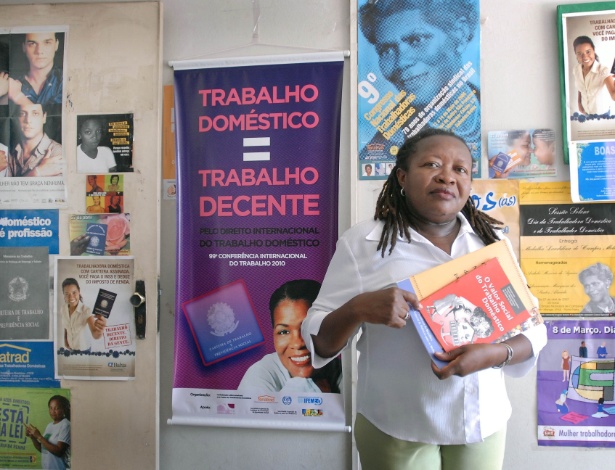

Winning rights for Brazil’s domestic workers

"Why does everyone have rights except us?," Brazilian housekeeper Creuza Maria Oliveira remembers asking over and over again all those many years ago. Today, after decades of organization and struggle, her country has finally given her an answer with the passage of a new law that guarantees the rights of domestic workers.
Oliveira, president of the Federation of Domestic Workers of Brazil (FENATRAD), was an active participant in the long process of negotiations that led, at the end of March, to the historic vote in the Brazilian Senate that for the first time protects nearby 6.5 million people working in domestic service.
A broad range of new rights
The law enshrines 16 new rights, ranging from a maximum workday of eight hours and a 44-hour work week, to overtime pay and a new provision requiring employers to pay the equivalent of 8 % of an employee’s monthly salary to a fund to be used in case of dismissal, death or other contingencies.
"It is not just about equal rights, it’s about social inclusion and historical redress" for the years of marginalization suffered by domestic workers, says Oliveira, whose organization was supported by the MDG Achievement Fund in its campaign to secure passage of the law.
Recent data from the International Labour Organization (ILO) estimates that there are 52.6 million domestic workers worldwide, the vast majority of them women (83 %), of which nearly a third are excluded from national labor legislation and almost half of whom have no right to rest breaks and paid vacations.
In the Asia-Pacific region, there are an estimated 21.4 million domestic workers, ahead of Latin America and the Caribbean, where the figure is 19.6 million, and Africa, with 5.2 million. Developed countries account for 3.6 million domestic workers, and the Middle East another 2.1 million, according to the ILO.
In Brazil, there were 6.2 million people working as domestics in 2008, 16% percent of total female employment women and 20 % of black women's employment. Most of these work in very precarious conditions: only a quarter of them have signed an employment contract that guarantees their rights.
Righting legal and social wrongs
Although Brazilian domestic workers had gained ground in recent years in the area of minimum wages and paid weekly rest days, they still suffered from legal and social inequalities as well as a lack of labor rights, according to a study by the ILO and the Brazilian government, supported by the "Inter-agency Programme for the Promotion of Gender and Ethnic-Racial Equality", one of three joint UN programmes funded by the MDG-F in Brazil.
The new law is the result, in part, of the impetus that led to the adoption at the 2011 ILO conference in Geneva of the Domestic Workers Convention, which stipulates that those employees should have the same rights as other workers, including schedules, weekly rest of at least 24 consecutive hours and limits on payments in kind.
A study funded by the MDG-F on the economic impact of increased income to domestic workers showed that by enhancing traditionally marginalized job categories it is possible to improve the living conditions of low-income populations and thereby to improve the welfare of society as a whole.
"Ensuring a minimum level of rights in the workplace is the ILO's mission, and this is very important in the case of domestic workers, whose profession is still under-regulated and who suffer from a disregard for fundamental labor rights and principles," said Marcia Vasconcelos, focal point for the MDG-F’s joint programme.
Increasing knowledge about domestics’ working conditions
The Inter-agency Programme for the Promotion of Gender and Ethnic-Racial Equality, a collaboration between the Brazilian government and four UN agencies (UNDP, ILO, UN-Habitat and UN Women), is part of the MDG-Fund’s work to help countries around the world achieve the Millennium Development Goals of reducing poverty and improving livelihoods for the most marginalized populations.
The programme supported studies and surveys on the situation of domestic workers in Brazil as well as technical meetings and workshops, and produced, among other publications, the report "Domestic Work in Brazil: Towards Institutional Recognition" and a technical note on child domestic labor in Latin America.